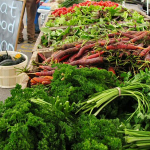Why The Abbey’s “Dishing Up Local!”

Ever since our inception in 84’ we have developed a deep understanding on the importance of locally sourced food. Though we know that if you’re on this site, you’re probably already an expert on the local food and Farm to School movements but event you’re not, here is a brief introduction:
The term ‘farm to school’ is largely considered to consist of efforts to connect schools with local food producers directly in order to serve local foods in school cafeterias. Farm to school is an offshoot of the entire local food movement.
There are numerous recognized benefits to, as we say, ‘dish up local’. Some of the primary benefits of the local food movement are the positive impacts on the environment, community, economy and people’s health.
Environmental:
- Avoids excessive fossil fuel use
- Reduces food miles and non-industrially processed foods
- Biodiversity encouraged through increases in organic production
Social:
- Helps build community vibrancy and retain local traditions
- Aids tourism and associated regional identity formation
- People desire more locally grown foods
Economic:
- Short supply chains and farmers’ markets keep income and employment local
- Fosters tourism and niche markets
Human:
- Fosters fresh, seasonal food intake
- Higher content of vital water-soluble vitamins (ie. no transcontinental shipping)
- Increased fiber and lower fat, sugar and salt content of non-industrially processed foods
Vermont is the nation’s leader in direct agricultural product sales due to our success with farmers markets and CSA shares and the importance we place on health. In 2008, the Center for Disease Control voted Vermont the healthiest state the country. Since 2000, the number of community supported agriculture shares in Vermont has increased by 500%.
Though Vermont has been credited to leading the nation, there has been a huge increase in farm to school programs across the country. This might largely be due to increased awareness of the national obesity epidemic spawning an increased awareness of food production and the desire to educate children on the dangers of over eating and unhealthy food.
For more information on the local food movement or the USDA supported Farm to School programs please visit http://www.farmtoschool.org/.